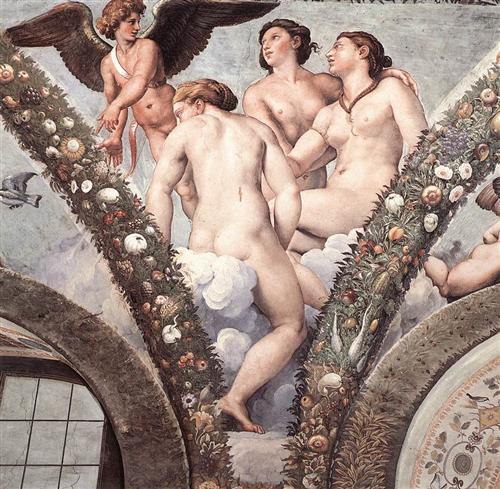Gratiae: the three GracesCupid and the Three Graces, RaphaelThe Charites (Three Graces) were reputed
Gratiae: the three GracesCupid and the Three Graces, RaphaelThe Charites (Three Graces) were reputed to be theessence of beauty, charm, and grace and were associated with the Nine Muses,who presided and inspired arts and sciences.The Charites were three goddesses, who were sistersbetween them: Aglaia (ΑγλαιαBrightness), Euphrosyne (ΕυφροσυνηJoyfulness), and Thalia (Θαλια Bloom).The character and nature of the Charites are sufficientlyexpressed by the names they bear: they were conceived as the goddesses who gavefestive joy and enhanced the enjoyments of lifePindar, Olympian Ode 14: “Kharites (Charites, Graces)three … Euphrosyne,lover of song, and Aglaia (Aglaea) revered, daughters of Zeus the all-highest .. . with Thalia, darling of harmony.”Theyare said to be daughters of Zeus and Hera (or Eurynome, daughter of Oceanus) orof Helios and Aegle, a daughter of Zeus.TheCharites were also joined in the banquets, celebrations by the Horae who werethe keepers of the gates to Mount Olympus.Aglaiawas the charis goddess of beauty, adornment, splendor and glory. Aglaia was athe wife of the god Hephaistos and like her she represented the creation ofobjects of beauty and artistic adornment.Homer,Iliad 18. 382: “Kharis (Charis) of the shining veil … the lovely goddessthe renowned strong-armed one [Hephaistos] had married.”Euphrosynewas the charis goddess of good cheer, joy, mirth and merrimentThaliawas the charis goddess of festive celebrations and rich and luxurious banquets.Frequentlythe Graces were taken as goddesses of charm or beauty in general and hence wereassociated with Aphrodite, the goddess of love; Peitho, her attendant; andHermes, a fertility and messenger god.Asattendants of Aphrodite they were goddesses of personal beauty and theadornments which enhanced this: makeup, oils, perfumes, fine clothing andjewellery. HomericHymn 5 to Aphrodite: “She [Aphrodite] went to Kypros (Cyprus), to Paphos, wherher precinct is and fragrant altar, and passed into her sweet-smelling temple.There she went in and put to the glittering doors, and there the Kharites(Charites, Graces) bathed her with heavenly oil such as blooms upon the bodiesof the eternal gods–oil divinely sweet, which she had by her, filled withfragrance.”Sometimesthey were depicted as companions of Apollo and the Muses:Hesiod,Theogony 53: “There [on Olympos] are their [the Muses’] bright dancing-placesand beautiful homes, and beside them the Kharites (Charites, Graces) … livein delight.”TheCharitesia were annual competitions and games in honor of the Graces. Therewere athletic competitions, literary, musical and dramatic contests (which tookplace in the theater). The Charitesia festival was held at Orchomenos near themodern town of Kalpaki. -- source link
#mythology#greek mythology#greece#ancient greece#roman mythology#rome#gratia#graces#charities
